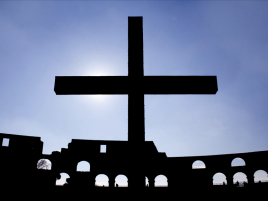Law Professors Urge European Court to Allow Crosses
By The Becket Fund | May 27, 2010

Thirty-seven law professors hailing from 11 countries have submitted written comments asking the Grand Chamber of the European Court of Human Rights to overturn a seven-judge panel’s ruling that crucifixes may not be displayed in Italian classrooms. The Grand Chamber of the Court, located in Strasbourg, France, will hold a hearing in the case on June 30.
Last November, a lower panel of the Court ruled in Lautsi v. Italy that the Italian government had violated the human rights of a Finnish atheist parent who objected to crucifixes displayed on the walls of her children’s classrooms. The panel’s decision to find a violation of the Convention provoked widespread outrage in Italy.
The coalition of law professors consists of prominent legal scholars from across Europe, including, for example, a past President of the Italian Constitutional Court. In their friend-of-the-court comments to the Grand Chamber, the law professors argue that the panel’s ruling needlessly threatens the wide variety of religious symbols on display on public property all over Europe, including national flags, coats of arms, and public art: “[T]he attempt to exile religious symbols and ideas from the public square would be foolhardy, because religious symbols and religious ideas are an integral part of the tapestry of European civilisation. Pull out that thread, and the entire tapestry unravels.”
The professors also warn that the panel’s decision risks setting off a widespread conflict between government and religion. Given the wide diversity of religious practices across Europe, it makes little sense to try to create a secularist “common denominator.” Rather, the professors argue, the Court should give states substantial leeway to structure the church-state relationship in harmony with tradition, history, and culture.
“A ban on religious symbols that offend someone, somewhere, is a ban on all religious symbols,” said Eric Rassbach, National Litigation Director at The Becket Fund for Religious Liberty, who was part of the team who drafted the comments, along with members of the law professor coalition and Professor Paolo Carozza of Notre Dame Law School in Indiana. “Rather than announcing a State crusade against religion, the Court should recognize that religion and government can be in harmonious dialogue with one another,” he added.














